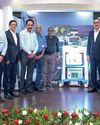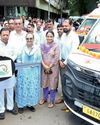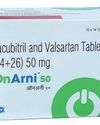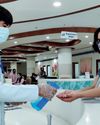
India's healthcare system is unique, complex, and multifaceted involving both the government and private sector to cater to the health needs of its 1.4 billion population. Insufficient infrastructure, inadequate funding, and a shortage of trained manpower have impacted healthcare delivery for decades. Coupled with these issues, the sector is also dealing with the complex needs of an aging population; the need to keep up to date with evolving advances in technology and medicine; heightened patient expectations; cost consciousness - all this against the backdrop of the economic setback of the pandemic.
Prevention first!
Adopting a prevention-first mindset is vital not only for alleviating the burden on the healthcare system but also for its aggregated socio-economic gains. As per studies, 86 percent of healthcare costs are associated with managing chronic diseases. A bulletin of the World Health Organization (WHO) mentions that "diagnostic testing has become necessary for diagnosing and monitoring disease".
India is undergoing a rapid health transition with the burden of Non-Communicable Diseases (NCDs). NCDs are estimated to account for 63 percent of all deaths in India of which cardiovascular diseases lead to 27 percent overall mortality. As per the National Programme For Prevention And Control Of Non-Communicable Diseases report 2023, the estimated loss of economic output due to NCDs, excluding mental conditions, will be $3.55 trillion for India for 2012-2030.
This story is from the {{IssueName}} edition of {{MagazineName}}.
Start your 7-day Magzter GOLD free trial to access thousands of curated premium stories, and 9,000+ magazines and newspapers.
Already a subscriber ? Sign In
This story is from the {{IssueName}} edition of {{MagazineName}}.
Start your 7-day Magzter GOLD free trial to access thousands of curated premium stories, and 9,000+ magazines and newspapers.
Already a subscriber? Sign In

KIMSHEALTH launches electrophysiology lab with 3D mapping
'ENSITE X' is the first of its kind in Kerala and the third in India enabling precise identification, mapping, and targeting the abnormal electrical activities in the heart.

Molbio boosts Goa's healthcare system with CSR initiatives
The company has donated four state-of-the-art Advanced Life Support (ALS) ambulances and two hearse vans for National Highway emergencies

USV introduces affordable heart failure medication
This cost-effective option addresses the rising cases of heart failure in India, offering lifesaving care to millions of patients who need it the most.

City Imaging & Clinical Labs to expand services to 50 hospitals
The company is currently associated with 10 hospitals, providing comprehensive lab management services, including 24/7 in-house phlebotomy and lab testing.

Oncare raises $1 million in seed funding, to set up 10 units
Oncare has raised $1 million in a seed funding round led by Huddle Ventures. It plans to deploy the raised capital to expand its operations to 10 new centers.

Nutrabay forays into Ayurvedic supplements market with Shilajit
Nutrabay's aims at gaining market share from the existing ayurveda supplements market with a distinctive product proposition and education about the benefits of Shilajit.

INDIA'S PREPAREDNESS ON HEALTHCARE-ASSOCIATED INFECTIONS: A GROWING FOCUS ON PATIENT SAFETY
The country's diverse healthcare landscape necessitates a flexible and multifaceted approach to infection control that can be adapted to various settings and resource levels.

TRANSFORMING CARDIAC SURGERY: HOW AI IS REVOLUTIONIZING PATIENT CARE AND OUTCOMES
Dr. Swarup Swaraj Pal shared his insights on the current state and future prospects of AI in cardiac procedures.

BEYOND THE LAB: THE CRITICAL ROLE OF LOGISTICS IN INDIA'S PHARMACEUTICAL INDUSTRY
As India continues to expand its role in the global pharmaceutical market, the importance of a robust, reliable, and innovative logistics infrastructure cannot be overstated.

LIFESTYLE DISEASES IN CHILDREN: A WAKE-UP CALL FOR A HEALTHIER GENERATION
In today's fast-paced world, children face an unexpected enemy: lifestyle diseases. Conditions like obesity, Type 2 diabetes, and hypertension are now affecting our youth. What's causing this shift, and how can we combat it?